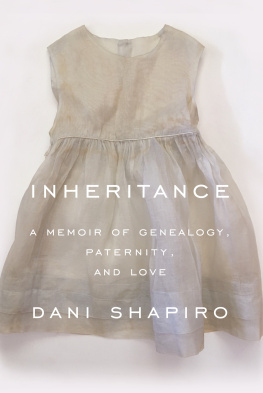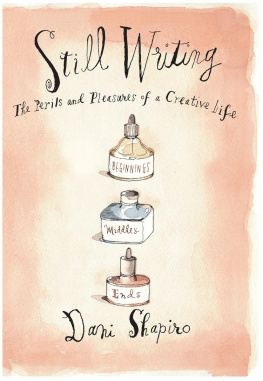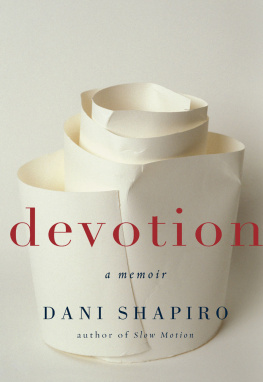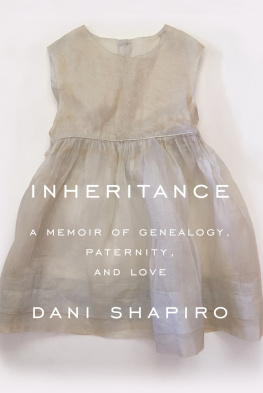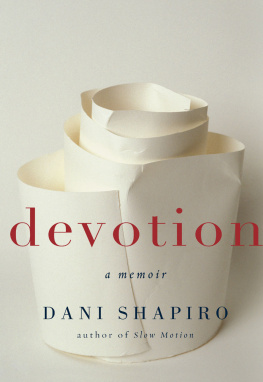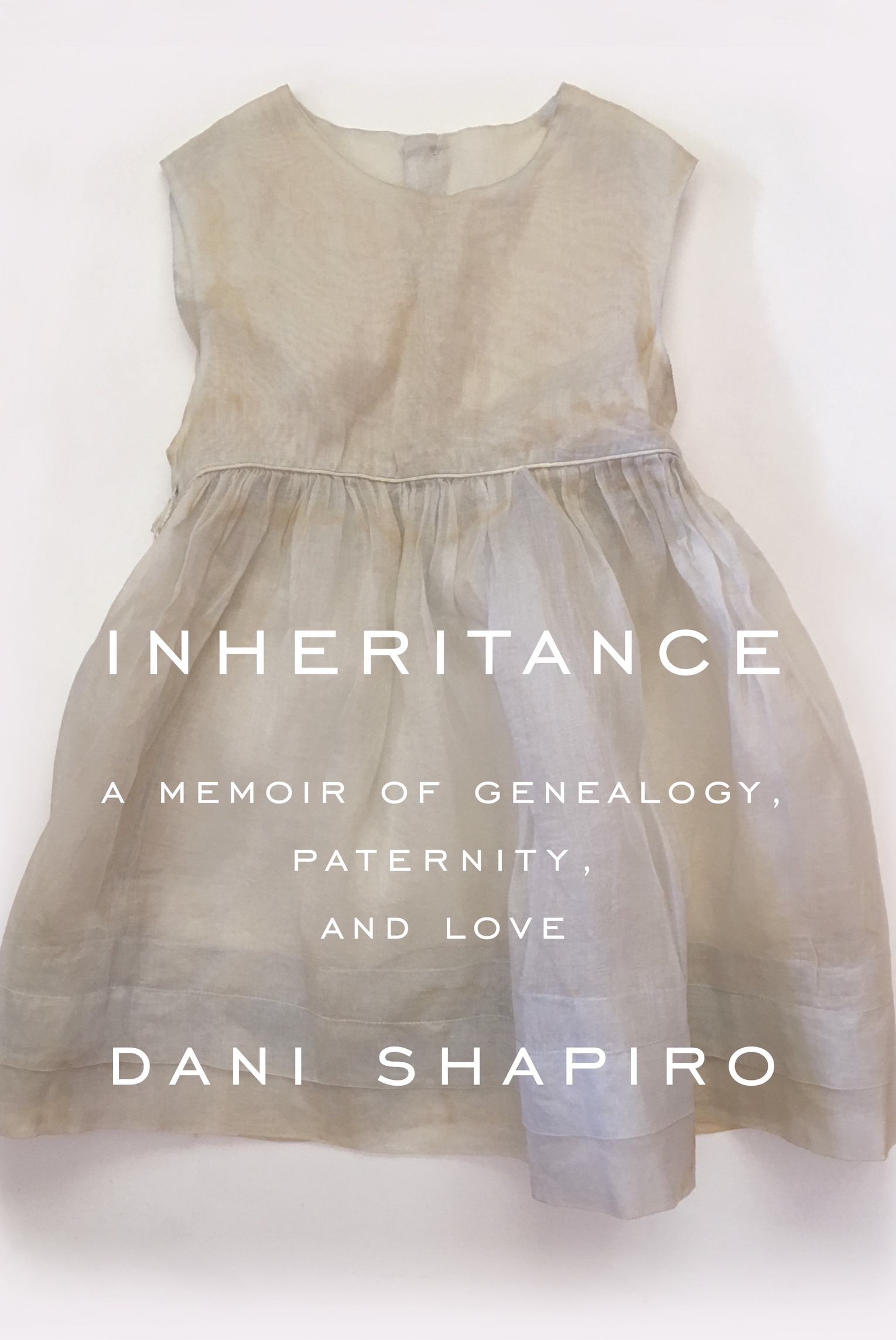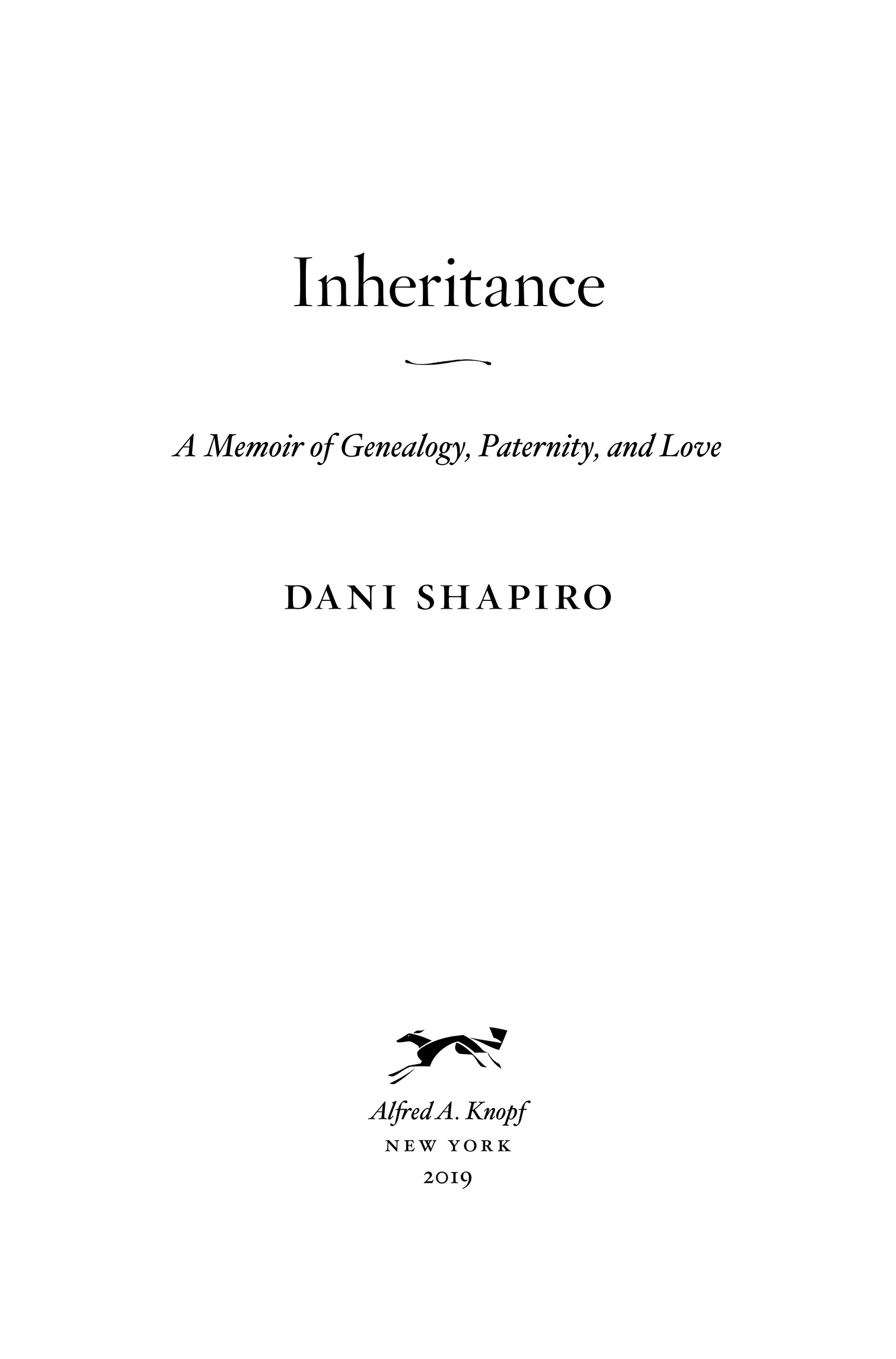ALSO BY DANI SHAPIRO
Hourglass
Still Writing: The Perils and Pleasures of a Creative Life
Devotion: A Memoir
Black & White
Family History: A Novel
Slow Motion: A True Story
Picturing the Wreck
Fugitive Blue
Playing with Fire
THIS IS A BORZOI BOOK
PUBLISHED BY ALFRED A. KNOPF
Copyright 2019 by Dani Shapiro
All rights reserved. Published in the United States by Alfred A. Knopf, a division of Penguin Random House LLC, New York, and distributed in Canada by Random House of Canada, a division of Penguin Random House Canada Limited, Toronto.
www.aaknopf.com
Knopf, Borzoi Books, and the colophon are registered trademarks of Penguin Random House LLC.
Library of Congress Cataloging-in-Publication Data
Names: Shapiro, Dani, author.
Title: Inheritance : a memoir of genealogy, paternity, and love / Dani Shapiro.
Description: First edition. | New York : Alfred A. Knopf, 2019.
Identifiers: LCCN 2018024082 (print) | LCCN 2018050939 (ebook) | ISBN 9781524732721 (ebook) | ISBN 9781524732714 (hardcover)
Subjects: LCSH : Shapiro, Dani. | Women novelists, AmericanBiography. | Novelists, American20th centuryBiography. | Jewish womenUnited StatesBiography. | BISAC: BIOGRAPHY & AUTOBIOGRAPHY / Literary. | BIOGRAPHY & AUTOBIOGRAPHY / Cultural Heritage. | BIOGRAPHY & AUTOBIOGRAPHY / Personal Memoirs.
Classification: LCC PS 3569. H 3387 (ebook) | LCC PS 3569. H 3387 Z 46 2019 (print) | DDC 818/.5403 [ B ]dc23
LC record available at https://lccn.loc.gov/2018024082
Ebook ISBN9781524732721
Cover photograph by Diana Weymar
Cover design by Carol Devine Carson
v5.4
ep
Contents
This book is for my father.
Authors Note
This is a work of nonfiction. In some cases, names and identifying details have been changed in order to respect and protect the privacy of others, and to keep a promise I made from the very start.
I shall never get you put together entirely,
Pieced, glued, and properly jointed.
Sylvia Plath, The Colossus
If you want to keep a secret, you must also hide it from yourself.
George Orwell, 1984
Part One
1
When I was a girl I would sneak down the hall late at night once my parents were asleep. I would lock myself in the bathroom, climb onto the Formica counter, and get as close as possible to the mirror until I was nose to nose with my own reflection. This wasnt an exercise in the simple self-absorption of childhood. The stakes felt high. Who knows how long I kneeled there, staring into my own eyes. I was looking for something I couldnt possibly have articulatedbut I always knew it when I saw it. If I waited long enough, my face would begin to morph. I was eight, ten, thirteen. Cheeks, eyes, chin, and foreheadmy features softened and shape-shifted until finally I was able to see another face, a different face, what seemed to me a truer face just beneath my own.
Now it is early morning and Im in a small hotel bathroom three thousand miles from home. Im fifty-four years old, and its a long time since I was that girl. But here I am again, staring and staring at my reflection. A stranger stares back at me.
The coordinates: Im in San FranciscoJapantown, to be precisejust off a long flight. The facts: Im a woman, a wife, a mother, a writer, a teacher. Im a daughter. I blink. The stranger in the mirror blinks too. A daughter. Over the course of a single day and night, the familiar has vanished. Familiar: belonging to a family. On the other side of the thin wall I hear my husband crack open a newspaper. The floor seems to sway. Or perhaps its my body trembling. I dont know what a nervous breakdown would feel like, but I wonder if Im having one. I trace my fingers across the planes of my cheekbones, down my neck, across my clavicle, as if to be certain I still exist. Im hit by a wave of dizziness and grip the bathroom counter. In the weeks and months to come, I will become well acquainted with this sensation. It will come over me on street corners and curbs, in airports, train stations. Ill take it as a sign to slow down. Take a breath. Feel the fact of my own body. Youre still you, I tell myself, again and again and again.
2
Twenty-four hours earlier, I was in my home office trying to get organized for a trip to the West Coast when I heard Michaels feet pounding up the stairs. It was ten-thirty in the evening, and we had to leave before dawn to get to the Hartford airport for an early flight. I had made a packing list. Im a list maker, and there were a million things to do. Bras. Panties. Jeans skirt. Striped top. Sweater/jacket? (Check weather in SF.) I was good at reading the sound of my husbands footsteps. These sounded urgent, though I couldnt tell whether they were good urgent or bad urgent. Whatever it was, we didnt have time for it. Skin stuff. Brush/comb. Headphones. He burst through my office door, open laptop in hand.
Susie sent her results, he said.
Susie was my much-older half sister, my fathers daughter from an early marriage. We werent close, and hadnt spoken in a couple of years, but I had recently written to ask if she had ever done genetic testing. It was the kind of thing I had never even considered, but I had recalled Susie once mentioning that she wanted to know if she was at risk for any hereditary diseases. A New York City psychoanalyst, she had always been on the cutting edge of all things medical. My email had reached her at the TED conference in Banff. She had written back right away that she had indeed done genetic testing and would look to see if she had her results with her on her computer.
Our father had died in a car accident many years earlier, when I was twenty-three, and Susie thirty-eight. Through him, we were part of a large Orthodox Jewish clan. It was a family history I was proud of and I loved. Our grandfather had been a founder of Lincoln Square Synagogue, one of the countrys most respected Orthodox institutions. Our uncle had been president of the Orthodox Union. Our grandparents had been pillars of the observant Jewish community both in America and in Israel. Though as a grown woman I was not remotely religious, I had a powerful, nearly romantic sense of my family and its past.
The previous winter, Michael had become curious about his own origins. He knew far less about the generations preceding him than I did about mine. His mother had Alzheimers and recently had fallen and broken her hip. The combination of her injury and memory loss had precipitated a steep and rapid decline. His father was frail but mentally sharp. Michaels sudden interest in genealogy was surprising to me, but I understood it. He was hoping to learn more about his ancestral roots while his dad was still around. Perhaps hed even enlarge his sense of family by connecting to third or fourth cousins.

